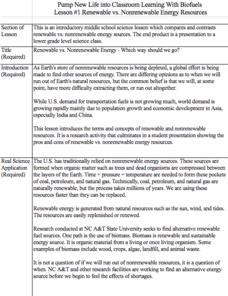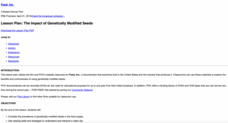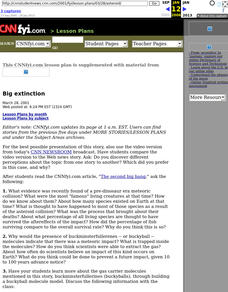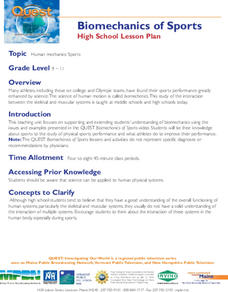Curated OER
In Case of Emergency
A natural disaster could strike at any time: do your learners know the school and community emergency plans? Start the school year by honing research and speaking skills in a practical way with this preparedness instructional activity....
Curated OER
Create a Weather Newscast
Fourth graders explore and study basic weather terms, strengthen research skill on the web and create a weather newscast. They choose a weather site on the web, copy weather maps and create a videotape based on a written script to...
Curated OER
Be a Weather Newscaster
Ninth graders, in groups, create and videotape a news broadcast. Each group researches, develops and writes a weather forecast, a commentary on an environmental concern, a school activity and a commercial.
Curated OER
Science Videos
Students plan, practice, and act in a 2-3 minute videotaped production about a specific topic. Students from a local high school give presentations pertaining to seasons, earth rotation, and moon phases. Students analyze the...
Curated OER
Weather Report
Students prepare a weather script for a broadcast. In this weather broadcasting lesson, student record the present temperature, high temperature, a sky watch, and the current moon phase to be presented in a school broadcast at the...
Curated OER
Create a Weather Newscast
Fourth graders explore, research and study how to make and give a weather newscast. They assess a variety of weather terms, research skills on the Web and develop an oral presentation on a weather newscast to present to their classmates.
Institute of Electrical and Electronics Engineers
Radio Reception and Transmission
After reading about radio transmission, application, and the difference between AM and FM, small teams of engineers use a kit to construct an FM radio and then send and receive broadcasts. This is an ideal activity for middle school STEM...
Howard Hughes Medical Institute
Winogradsky Columns: Microbial Ecology in the Classroom
Winogradsky columns are ideal for observing the role of bacteria and other microorganisms in an ecosystem. This student activity guide is complete with data tables for observations and analysis questions for processing what was observed....
Curated OER
Webquest: Eradicating Guinea Worm Disease in Ghana
Learners examine the impact of Guinea Worm Disease. In this world issues lesson, students take on the roles of Peace Corps Volunteers. Learners will apply their knowledge of the Guinea worm life cycle to create a plan for eradicating the...
Curated OER
Sculptured Landscapes
Students research glaciers, how they are formed and what kind of landforms they carve out of the rock they pass over. They organize their findings into a mock newscast in a presentation for the class.
Kenan Fellows
Renewable vs. Nonrenewable Energy Resources
Is one type of energy inherently good or bad? Young scientists explore energy resources in a week-long unit. After extensive research, groups create powerful position statements and presentations supporting their energy resource of choice.
PBS
Blow the Roof Off!
Blow the minds of young scientists with this collection of inquiry-based investigations. Based on a series of eight videos, these "hands-on, minds-on" science lessons engage young learners in exploring a wide range of topics...
Curated OER
Meteorologist Me: Climate and Weather Case Study
Fifth graders research weather and climate for selected cities and create identification cards within a database. They prepare an oral presentation on a simulated on-location weather broadcast.
Curated OER
Holidays: Stress on the Body
Young scholars read an article on stress and holiday weight gain. In this biology lesson, students research about the body's response to excess sugar in the diet. They create a pamphlet, billboard, newscast or journal article containing...
Curated OER
Dateline: El Niño
Students explore El Nino and take the role of a reporter gathering the facts for a news story. Reports are presented orally, like a newscast, written or in whatever form the teacher prefers.
Curated OER
Eco-Warrior
Young scholars recognize that a man's actions in changing his environment can have drastic results for their world. They discuss the use of energy conservation and the use of recycling materials to improve our environment.
University of Wisconsin
Getting the Word Out
An appropriate way to celebrate and conclude the construction of a rain garden is to share it with the community. Small groups collaborate to design an outreach product such as a PowerPoint presentation, brochure, or poster, to draw...
Curated OER
Fracking: Positive or Negative Impact?
Your teenagers may have heard of fracking, but do they really know what it is? And could they debate the benefits and risks? Educate your environmental science class with a lesson about hydraulic fracturing, non-renewable energy...
PBS
The Impact of Genetically Modified Seeds
What is all the fuss about genetically modified foods? PBS provides this resource designed to supplement the documentary Food, Inc. to help learners investigate the benefits and controversies of genetically modified foods...
Curated OER
Survival: The Human Body in Extreme Environments
Students create a list of signs the human body gives during threatening weather conditions. They investigate the causes and conditions of dehydration, overheating, and hypothermia.
Curated OER
Big Extinction
Students discuss evidence of a pre-dinosaur era meteoric collision, and its impact on living creatures. They build buckyball molecule models out of marshmallows, toothpicks, and soccer balls.
Curated OER
Biomechanics of Sports
Students study biomechanics. They apply their understanding of sports to determine what athletes do to improve their performance. They participate in a series of lessons and activities.
Curated OER
Science in Focus: Force and Motion
Students explore force and motion through a series of experiments. In this physics lesson, students create and interpret speed graphs. They build an electromagnet and explain the factors affecting its strength.
Curated OER
Progression's Price
Students reflect upon their regional and national environments, analyze causes of environmental problems as well as their implications, and examine effects of population growth as they participate in "The Popcorn Game."























